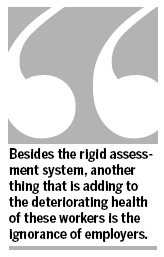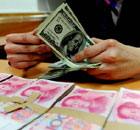-
-
China Daily E-paper
Op-Ed Contributors
Are our best professionals fried?
By Qi Rang (China Daily)
Updated: 2010-04-06 07:55
 |
Large Medium Small |

Worrying figures of physical, mental illnesses among scientists and high-tech professionals need government attention
From depression, ulcers, migraines and insomnia, scores of China's scientists and high-tech professionals are feeling the pressure to succeed and gritting through tremendous ailments, illnesses and pain.
A recent survey by the China Association for Science and Technology on the health and fitness of a large number of professionals in China's science and technology fields shows that many are suffering from different kinds of chronic occupational diseases. For example, about 11.5 percent had some cardio-cerebral vascular illness, 10.6 percent had digestive ulcers, 8.4 percent had chronic fatigue syndrome, and 7.9 percent were suffering from anxiety. Migraines, diabetes and bronchial asthma were also wearing down on the professionals.
What this clearly shows is that there needs to be more attention paid to the physical and psychological conditions of these workers. It also highlights the fact that the excessive pressures they face is one of the main factors why there is widespread illness among the majority of China's science and technology workers.
According to the survey, overtime hours, such as in the evenings or on holidays, with some working more than 50 hours per week, is taking a toll.
Adding to the pressure and burden on these professionals is the rigid method of assessing their performance adopted by a large number of China's research institutions, such as hospitals and institutes of higher learning.
Chronic fatigue syndrome reportedly is one of the main illnesses that result from this unscientific assessment method.
The survey also found that workers in the science and technology sectors are also suffering from various psychological or mental troubles compared with other professionals. About 10.7 percent within the survey said they feel that their lives are meaningless from time to time and 35.7 percent said that their energy level drops at work and that they are prone to fatigue. Some of them also said they are experiencing insomnia, low levels of enthusiasm and moodiness. Many indulge in drinking and smoking to battle their anxiety and depression.
Besides the rigid assessment system, another thing that is adding to the deteriorating health of these workers is the ignorance of employers.
Among the 106 employing units surveyed, 23.6 percent have never organized any health training or held any discussions for their employees. About 30.2 percent of employers said they did organize these outings but it occurs only once every few years, according to the survey. Some employers have sponsored health education activities, but the sessions were mainly targeted at aging employees. There apparently just aren't any activities aimed at middle-aged or young employees.
These professionals, however, can also be blamed for disregarding their own health and ailments. According to the survey, 30.1 percent have not had their blood pressure taken within a year or have never had such a test.
More than 40 percent have never had their blood sugar and blood fat tested nor do they even know what their measurements are for these tests.
They're also not taking care of their bodies. More than 41 percent of male science and technology workers, according to the survey, are smokers; the proportion total would be as high as 28 percent even if female workers were included. An unhealthy lifestyle of not eating good foods and lacking in exercise has also led to their deteriorating health.
These professionals play a crucial role in the country's economic and technological development, and their poor health is a great concern that should invite a high-degree of attention from the government. Great efforts are in desperate need to improve this situation.
Employers should organize regular health education activities. They should make a healthy lifestyle popular for employees to follow. Some lectures about health should be regularly held to help overloaded employees adjust mentally and ease their psychological pressures. Concrete measures should be taken to relieve them of their tremendous workload. The current system of assessing an employee's performance should be changed to ease their workload pressures. These professionals should also be freed from unnecessary administrative posts to help them focus more on their scientific and technological research.
Sufficient funds are needed to improve the current health service system aimed at the country's science and technology workers.
To this end, the central and local governments should set up a special health fund for this group and tilt financial input to grassroots workers to ensure they have a necessary physical examination, once a year at least.
If necessary, their health conditions should be included into the performances assessment system. Investment into employee health services should be listed in the annual budget of employers. A more effective paid holiday system should be put in place to guarantee that these professionals enjoy regular rest from daily work. To effectively implement these measures, employers who fail to implement this system should bear the brunt of publicized criticism.
These workers should also be allowed to vent their pressures and stress with psychologists or mental health workers provided by the employers. This will play a positive role in helping them shape their careers, establish moderate reachable development goals and remove passive emotions in a timely manner.
The author is vice-president of China Association for Science and Technology.
(China Daily 04/06/2010 page8)









